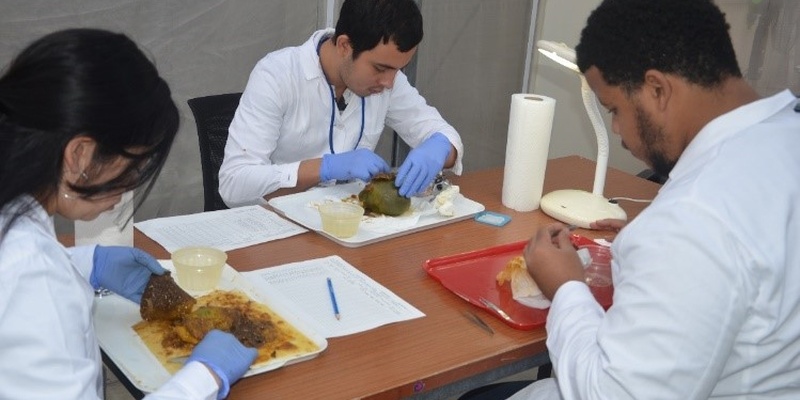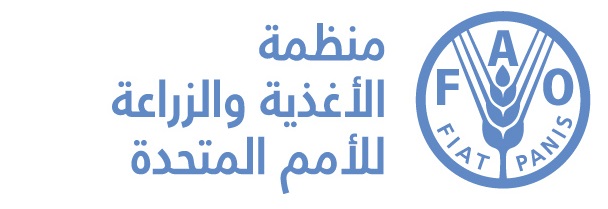Modified atmosphere storage does not reduce the efficacy of phytosanitary irradiation treatments for Tephritidae fruit flies
Posted on جمعة, 19 يوليو 2019, 07:13

Figure 1: Ms. Olga Barrera, Mr. Luis Caravantes, and Mr. Alexandre Araujo dissecting irradiated mangoes for phytosanitary research. © IAEA
12 July 2019, Vienna - The Technical Panel for Phytosanitary Treatments (TPPT) just ended their annual meeting at the Headquarters of the International Atomic Energy Agency (IAEA), in Vienna, Austria, where they reviewed scientific data from a recent study carried out by the Joint FAO /IAEA Division of Nuclear Techniques in Food and Agriculture. This study was carried out under the technical supervision of Ms Vanessa S. Dias and was undertaken to understand how low oxygen influences the efficacy of irradiation treatments in tephritid fruit flies.
Currently, phytosanitary irradiation treatment schedules do not permit the use of phytosanitary irradiation of commodities under low oxygen storage (used to maintain commodity quality), requiring scientific evidence that demonstrates treatment efficacy under such conditions; in fact some studies suggested that low oxygen storage may reduce treatment efficacy.
Ms Vanessa S. Dias presented the results of the above mentioned study that indicate that tephritid fruit flies may enhance their antioxidant defenses during low oxygen exposure which, in turn, reduces oxidative stress and increases the resilience of the cells to low doses of irradiation. However, at irradiation doses near those required for treatment schedules, this slight increase of resilience is not sufficient to reduce efficacy of the treatment. In laboratory trials, no difference in survival of four tephritid fruit fly species was found whether stored in low oxygen before and during irradiation or not.
- After treating thousands of third-instar fruit fly larvae at sub-lethal and lethal doses of irradiation under low levels of oxygen, we are confident that the use of phytosanitary irradiation for commodities stored under modified atmosphere is safe and does not reduce the efficacy of the treatment*, said Vanessa S. Dias, Expert entomologist at the Joint FAO/IAEA Division.
The TPPT assessed the findings and agreed that there is no evidence to support a reduction in efficacy of phytosanitary irradiation of the four tephritid fruit fly species whether they are in fruits that have been stored in low oxygen or not. The TPPT agreed that, for Tephritidae, modified atmosphere storage does not reduce irradiation treatment efficacy.
The results of this assessment will be presented to the Standards Committee to consider the removal of the restriction from irradiation treatments targeting tephritid fruit flies. As modified atmosphere storage is increasingly used to preserve postharvest fruit quality, this will result in more applicable and scientifically sound phytosanitary treatments.
The full results are expected to be published in an international journal by the end of this year.
About the Technical Panel on Phytosanitary Treatments (TPPT)
The TPPT, formed by worldwide experts, is the drafting group for phytosanitary treatments as annexes to ISPM 28 (Phytosanitary treatments for regulated pests) and draft ISPMs on treatment requirements. Its main objective is to develop scientifically sound phytosanitary treatments to facilitate safe trade among contracting parties, under the guidance of the SC.
To learn more about the TPPT and see the meeting report (which will soon be posted) see: https://www.ippc.int/en/core-activities/standards-setting/expert-drafting-groups/technical-panels/technical-panel-phytosanitary-treatments/
strong text

